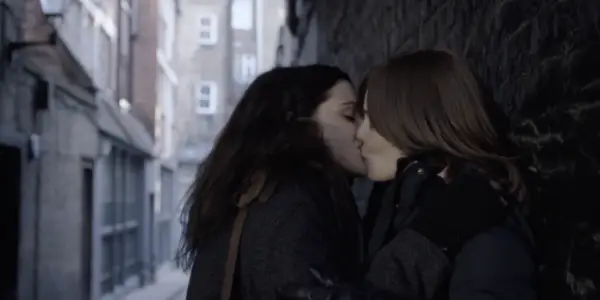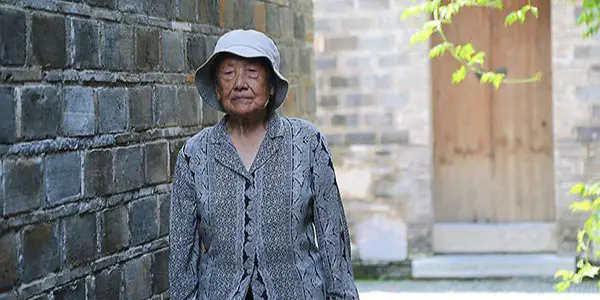Tribeca Film Festival: Oppression, Fear & Freedom Dominate In DISOBEDIENCE, LEMONADE, THE GIRL AND THE PICTURE & NICE

Stephanie Archer is 39 year old film fanatic living in…
Throughout the festival this year, there were several films with woman in the forefront – a focus on a variety of emotions, challenges and living conditions they are forced to endure and conquer. Whether it be through religion, political power, fear of the past or fear of the future, these films put woman’s issues and struggles in the forefront.
Disobedience

Disobedience was a film that had a lot of buzz going into it. Having premiered last year at the Toronto International Film Festival, there had been nothing but rave reviews for the story it presented and the cast that brought it to life. I didn’t know to much about it and had tried to stay away from previous reviews as I wanted to experience it and formulate my own opinion without other influences muddling the film. A fellow writer who had seen the film last year (yes, this alone spoke well for the film as she was seeing it again) had described the film as intense – and it certainly was.
Adapted from the book of the same name by author Naomi Alderman, Disobedience from director Sebastián Lelio follows the story of Ronit Krushka (Rachel Weisz) who has returned home for the first time in years to bury her father – the beloved Rabbi of the community. Ostracized by those around her for abandoning her home, father and religion years earlier, Ronit finds she has few friends and even less support. She finds sanctuary in the home of her childhood best friends Esti Kuperman (Rachel McAdams) and David Kuperman (Alessandro Nivola), who have since become tied in marriage.
As the week of ceremonies honoring, remembering and laying her father progresses, what once drove Ronit away begins to resurface – a long forbidden love with her friend Esti reignited. Caught in the act years earlier by her father, Ronit had left, choosing freedom of choice over the love of her father and family. Esti, who had stayed behind, tried to conform to the beliefs of the orthodox Jew, suppressing her true self. Yet, with the flame reignited, the lives of both these woman may be forever changed.
Sebastián Lelio brings the story of two woman, forbidden to love but forever drawn to one another, to life with such delicacy and caress. His gentle touch is matched with the strength of his cast who dive into their roles with solid strength of conviction. Disobedience challenges itself to tackle women’s rights, religion, head of the household, freedom, love and sexual preference and it succeeds in every aspect. The oppression of women, no matter there sexual preference, still occurs today through various countries, societies and religions. Expected to adhere and bend to the will of man, these women are raised from birth to understand their place and approved actions. With Disobedience, we are able to examine the potential of another way and another freedom.
Lemonade

Sadly, Lemonade from writer and director Ioana Uricaru is a film I do not think I could watch again. While many times to painful to watch, Lemonade puts the lives and struggles of immigrants in the US under a harsh light – not just the policies and procedures they must adhere to, but the abuse of power they must endure to avoid being sent back to their country. Like Disobedience, this was another film that arrived at the Tribeca Film Festival with a lot of buzz having premiered at the Berlin International Film Festival back in February. Lemonade was truly heartbreaking.
Lemonade follows the story of Mara (Mãlina Manovici) trying as hard as she might to follow the straight away to obtain her green card. She has married a patient (Dylan Smith) from her physical therapy job, arranged for her son Dragos (Milan Hurduc) to come across seas from Romania and received admission for her son into one of the best schools in the area. Everything seems to be going according to plan, until her immigration officer Moji (Steve Bacic) begins poking holes in her love story used to validate her marriage for her green card. Catching her in a lie, Moji now has the power and the upper hand eliciting sexual favors in exchange for overlooking her false testimony. As everything else around her starts to fall apart, she is faced with deportation or the complete loss of self.
Lemonade was solid, each seam of each part of Mara’s story tightly packed and paced into an unbelievable amount of situations and horror for this woman and her son. Through her betrayals and struggles, it was amazing to see how quickly the people we trust can turn on you, as well as the length one will go through in order to survive, to stay in this country and just to have the chance to create a better life for their child.
There is a beauty in the shifting of languages between Romanian and english, creating a more immersive experience for the audience but also becoming a parallel to the different sides of our main character – the one she tries to portray and the one who shows her true intentions. There were amazing performances all around from Mãlina Manovici, Milan Hurduc, and Steve Bacic, who find the strength to tackle each of these difficult situations and execute their performances flawlessly. This is not a film for the faint of heart, but the issues it presents can not go unnoticed.
The Girl and the Picture

While in my opinion one of the least talked about shorts offered this year at the Tribeca Film Festival, The Girl and the Picture by Vanessa Roth remains just as impactful. I had no idea what I was walking into when I had chosen to watch this film, but what I got was a lesson in history and the heartbreaking story of a woman who lost it all, hiding in her memories for years before she finally found her voice.
When you think pre-World War 2 and during, Germany is the primary tragedy that comes to mind. Little did I know the horrors Japan had forced upon the lives of the Chinese as they invaded their country – before Hitler and his genocide of the Jews had even begun to take full force. In 1937, Japanese forces invaded Nanjing, China with the soul purpose of wiping out family and generations. Very few survived the massacre, many who did would never speak of it again. Madame Xia Shuqin was 8-years-old when the Japanese stabbed her and murdered her family. Shown kindness from a local priest following the devastation, Madame Xia finds a new life to lead – never speaking of the family she lost or the terrible events of that night.
After some coaxing from her daughter, Madame Xia begins to share what happened to her, eventually contributing the information she had held so close to herself with a nation. Overcoming the terror that she endured to finally speak up and to finally communicate with her daughter, Xia passes down her generational information and family history. As a viewer, it is an awakening into the horrors of humanity – yet a reminder that with the evil there will always a light of hope – the woman who survived too remember her family and what happened, passing it down and fighting for a massacre to never be forgotten.
NICE

While we usually do not focus on television, I couldn’t resist trying a bit of everything during my time at this year’s festival. The festival provides a plethora of media forms from film to television, video games to VR experiences. Dipping my toe into something different, I was pleased to find that the quality of the work showcased at the Tribeca Film Festival was superb all around.
For the second year, Tribeca TV showcased a set called Pilot Season. First episodes from potential or upcoming shows are given a chance to shine and show their potential. Branching out this year on the variety of content I wanted to cover, I found a success in Naomi Ko‘s Nice.
Following the life of 23-year-old college student Teddy (Naomi Ko), viewers are introduced to a Korean -American character confident in herself, sarcastic and relatable. She says out loud many times what we are thinking. I was immediately drawn to her character, initially because she reminded me of Christina Yang (Sandra Oh) from Grey’s Anatomy (the McNurse comment only solidified this more), secondly, because of her sarcastic nature and view of the world. Her carefree spirit is immediately recognizable and many will find this an aspect of character they can stand behind.
This immediate connection created with the character is why your sympathy and emotional connection increases when it is revealed to Teddy and the audience that her cancer has returned. In an instant, her entire world is changed, and as she decides to keep her diagnosis a secret, we begin to see a different side of her and have a different view point of those she interacts with later on. With her family finally introduced, we see this character we just met shifting her focus on what matters and internally struggling with herself and those around her.
I found myself wanting more at the conclusion of this pilot episode. I wanted to know how the family would discover the return of Teddy’s cancer. I would definitely enjoy a chance to follow her story and her journey through this tumultuous time in her life, as well as see the ripple effects it will inevitably create for those around her. While she would normally face the culturally judgmental aspect of her family and their expectations, this is compounded with her fear of her cancer and suppressing the knowledge within her.
Does content like this matter to you?
Become a Member and support film journalism. Unlock access to all of Film Inquiry`s great articles. Join a community of like-minded readers who are passionate about cinema - get access to our private members Network, give back to independent filmmakers, and more.













